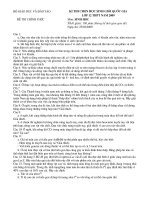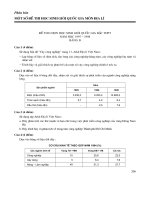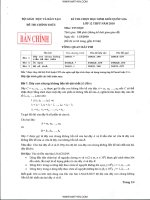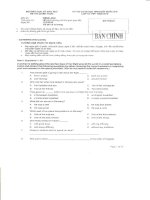De thi HSG Quoc gia 2010 Anh van
Bạn đang xem bản rút gọn của tài liệu. Xem và tải ngay bản đầy đủ của tài liệu tại đây (390.61 KB, 12 trang )
<span class='text_page_counter'>(1)</span><div class='page_container' data-page=1>
<b>BỘ GIÁO DỤC VÀ ĐÀO TẠO KỲ THI CHỌN HỌC SINH GIỎI QUỐC GIA </b>
<b>ĐỀ THI CHÍNH THỨC LỚP 12 THPT NĂM 2010 </b>
<i>Môn thi: </i> <b>TIẾNG ANH </b>
<i>Thời gian thi </i>: <b>180 phút (không k</b>ể thời gian giao đề)
<i>Ngày thi: </i> <b>11/3/2010 </b>
Đề<i><b> thi có 12 trang </b></i>
• <i>Thí sinh khơng được sử dụng tài liệu, kể cả từđiển. </i>
• <i>Giám thị khơng giải thích gì thêm. </i>
______________________________________________________________________
<b>I. LISTENING (4/20 points) </b>
<b>HƯỚNG DẪN PHẦN THI NGHE HIỂU </b>
<b>SỐ PHÁCH </b>
• <i>Bài nghe gồm 3 phần, mỗi phần được nghe 2 lần, mỗi lần cách nhau 15 giây, mởđầu và kết thúc </i>
<i>mỗi phần nghe có tín hiệu. </i>
• <i>Mởđầu và kết thúc bài nghe có tín hiệu nhạc. Thí sinh có 3 phút để hồn chỉnh bài trước tín hiệu </i>
<i>nhạc kết thúc bài nghe. </i>
• <i>Mọi hướng dẫn cho thí sinh (bằng tiếng Anh) đã có trong bài nghe. </i>
<b>Part 1: Questions 1- 10 </b>
<i><b>A woman is talking about the last few days of her flight around the world in a small aeroplane. </b></i>
<i><b>Listen and answer the following questions by either choosing the correct answers or supplying </b></i>
<i><b>your own answers in the space provided. (You do not need to write full sentences.) </b></i>
1. The woman pilot is going to talk about her flight ______.
A. from London
B. over Norway
C. back to London
D. around Europe
2. Who met her when she landed in Norway last week?
A. Her husband and son.
B. Two of her friends.
C. Two of her colleagues.
D. Two other pilots.
3. They gave her ______ before she resumed her flight the next morning.
A. a Norwegian breakfast
B. a Continental breakfast
C. an English breakfast
D. a nicely-cooked breakfast
4. What did her son do in Germany?
A. He was a chef.
B. He was a pilot.
C. He was pilot trainer.
D. He was a cook.
5. Which part of her plane had problems on Monday?
A. One of the engines.
B. One of the back wheels.
C. One of the front wheels.
D. One of the wings.
6. She finally landed in Holland ______.
A. with great ease
B. with some difficulty
C. with big difficulty
D. without any problems
7. Where in Holland did she spend her time?
</div>
<span class='text_page_counter'>(2)</span><div class='page_container' data-page=2>
9. When did she arrive at the destination?
_____________________________________________________
10. Who welcomed her when she finally landed after the long trip?
_____________________________________________________
<b>Part 2: Questions 11- 25 </b>
<i><b>Listen to the announcement of the re-opening of a tourist attraction called The Grand Palace </b></i>
<i><b>and fill in the missing information in the numbered space. </b></i>
<b>The</b>
Grand Palace
<i><b> </b></i>
<b>is open again! </b>The repairs to the (11) ________________________ are finished.
But work still goes on to repair the (12) ________________________ of the building.
The damage was caused by (13) ________________________ last year.
The photographs of the work are displayed in (14) ________________________.
These photographs show (15) ________________________________________.
The Palace was built as (16) ________________________ for the King and his family.
It was built in (17)__________________________ and decorated in (18) _________________ styles.
In the music room, you can see the Queen’s (19) ________________________.
The dining table upstairs can seat (20) ________________________ with silver dinner plates.
On fine days, refreshments are served in (21) ________________________.
The Palace is open every day 10:00 – 18:00 from June to (22) _______________________ and from
(23) ___________________________ from October to May.
A family ticket costs (24) _________________ while a student ticket costs (25) _______________.
<b>Part 3: Questions 26- 40 </b>
<i><b>Tim and Jane are talking about their courses of study. Listen to them and supply the missing </b></i>
<i><b>information in the space provided. (You do not need to write full sentences.) </b></i>
TIM JANE
Day of arrival Sunday (26)
Subject (27) (28)
Number of books to read (29) (30)
Day of the first lecture (31) (32)
Topic of the first lecture (33) (34)
Strategies for attending
lectures
(35) (36)
Strategies for reading (37) (38)
</div>
<span class='text_page_counter'>(3)</span><div class='page_container' data-page=3>
<b>II. LEXICO-GRAMMAR (6/20 points) </b>
<i><b>Part 1: Choose the word or phrase that best completes each sentence. Write your answer (A, B, </b></i>
<i><b>C, or D) in the numbered box. </b></i>
41. Turn off this radio, please. The harsh sound really ______ me crazy.
A. takes B. worries C. bothers D. drives
42. The Martins have confirmed their strong ______ to charity by donating a lump sum of
money again.
A. compliance B. commitment C. assignment D. reliance
43. His ______ of the safety regulations really cannot be ignored any longer.
A. disregard B. unfamiliarity C. carelessness D. inattention
44. Mrs. Jones was in deep ______ after her husband’s unexpected death.
A. regret B. grief C. lament D. disturbance
45. She ______ fainted when she heard that her mother died.
A. utmost B. most all C. all most D. almost
46. The other party has raised a number of ______ to the reforms in the tax system.
A. problems B. objections C. difficulties D. complaints
47. My older brother is extremely fond of astronomy. He seems to ______ a lot of pleasure from
observing the stars.
A. derive B. possess C. seize D. reach
48. Several secretaries were brought in ______ the signing of the contract.
A. as witness B. to witness C. witnessing D. having witnessed
49. "Don’t get so nervous about his coming late. When you get to know him better, you’ll learn to
take it ______."
A. easy B. loose C. nice D. fine
50. "Just ______ these proofs for me as I'm in a hurry."
A. run into B. run off C. run over D. run out
<i><b>Your answers </b></i>
41. 46.
42. 47.
43. 48.
44. 49.
45. 50.
<i><b>Part 2: Write the correct FORM of each bracketed word in the numbered space provided in the </b></i>
<i><b>column on the right. (0) has been done as an example. </b></i>
(0) ________ (HISTORY), Mars was thought to be the most likely
planet to harbour life. There is a reflection of such (51) ________ (BELIEVE)
in popular culture as expressed in literature, radio and film. Public fascination
with Martians began in the late 19th century when, in 1877, astronomer
Giovanni Sciaparelli reported (52) ________ (OBSERVE) of large channels
on Mars.
<b>0. </b><i><b>Historically </b></i>
51. ______________
</div>
<span class='text_page_counter'>(4)</span><div class='page_container' data-page=4>
In 1897, H. G. Wells’ The War of the Worlds was the first major work to
explore the (53) ________ (CONCEIVE) of the “extraterrestrial invader” and
exerted a substantial influence on the public psyche.
A few years later, even (54) ________ (KNOWLEDGE) astronomers
such as Percival Lowell seriously advocated the possibility of life forms as
described in his book Mars as the Abode of Life (1910). Consequently, Mars
began to take a special place in popular culture around the turn of the 20th
century, (55) ________ (CONTINUE) until today. However, this does not
(56) ________ (LITTLE) the unique role of Mars in the history of science.
Specifically, the (57) ________ (DOCUMENT) of the movement of
Mars, by Johannes Kepler (1571-1630), led to the formulation of his three
laws of (58) ________ (PLANET) motion which shattered mediaeval
anthropocentric notions of astronomy and laid the foundations for the
(59) ________ (DISCOVER) of Isaac Newton (1643-1727). Like no other
planet, Mars has left (60) ________ (REPLACE) marks on human
imagination and thought.
53. ______________
54. ______________
55. ______________
56. ______________
57. ______________
58. ______________
59. ______________
60. ______________
<i><b>Part 3: The passage below contains 10 mistakes. Underline the mistakes and correct them in </b></i>
<i><b>the space provided in the column on the right. (0) has been done as an example. </b></i>
The word processor and calculator are with doubt here to stay, and in many
respects of our lives are much richer for them. But teachers and other
academics are claiming that we are now starting to feel the first significant
wave of their effects on a generation for users. It seems nobody under the
age of 20 can spell nor add up any more. Even several professors at leading
universities have commented about the detrimental effect the digital revolution
has had at the most intelligent young minds in the country. The problem,
evidently, lies with the automatically spell-check now widely available on word
processing software. Professor John Silver of the Sydney University,
Australia, said, “Why should we bother to learn how to spell correctly or to
learn even if the most basic of mathematical sums, when at the press of a
button we have our problem answering for us? The implications are
enormous. Will adults of the future look on the computer to make decisions for
them, to tell them who to marry or what house to buy? Are we heading for a
future individually incapable of independent human thought?”
0. with Ỉ without
61. ______________
62. ______________
63. ______________
64. ______________
65. ______________
66. ______________
67. ______________
68. ______________
69. ______________
70. ______________
<i><b>Part 4: Supply the correct form of the VERB in brackets to complete the passage. Write your </b></i>
<i><b>answer in the numbered box. </b></i>
</div>
<span class='text_page_counter'>(5)</span><div class='page_container' data-page=5>
devastating diseases. Although the Salk vaccine (72. NOT BE) ________ one hundred percent
effective, it (73. DECREASE) ________ the cases of polio considerably.
Tuberculosis once (74. KNOW) ________ as the white plague (75. STUDY) ________
intensively. As a matter of fact, it is curable if it is detected in its early stages. We still have cancer
(76. DEAL) ________ with, but research workers and doctors over the world are striving to find a way
to prevent and cure it. (77. JUDGE) ________ from past experience we can expect that encouraging
news (78. ISSUE) ________ from time to time.
Heart disease, the greatest killer of mankind, is now in the process of being overcome. An
example of the techniques that (79. DEVELOP) ________ is that of heart massage: When a heart
stops nowadays while the patient is under anesthesia, the doctor opens the chest, massages the heart and
revises the patient. Even a few years ago, such an operation would (80. BE) ________ inconceivable.
<i><b>Your answers </b></i>
<i>71. 76. </i>
<i>72. 77. </i>
<i>73. 78. </i>
<i>74. 79. </i>
<i>75. 80. </i>
<i><b>Part 5:</b><b>Fill each gap in the following sentences with one of the prepositions or particles in the </b></i>
<i><b>box. Use each word only ONCE and write your answer in the numbered box. (Please note that </b></i>
<i><b>the given words outnumber the gaps.) </b></i>
across at against apart between by
in of out over under for
81. The committee does not approve of any immediate changes. They say the modifications should be
introduced step ________ step.
82. She felt a bit dizzy and had to lean ________ the wall before walking on.
83. "We can’t give up. Now that we have gone through the most difficult part of the route we must
reach the destination ________ any cost."
84. There has been a rise ________ the number of people buying their own cars.
85. His ball control skills really set him ________ from the rest of the players.
86. His business has gone ________, and he has lost everything.
87. "Please, don't forget that this is only ________ you and me."
88. I asked her to repeat her request because I could not make ________ what it was.
89. Professor Ha has a good knowledge ________ his subject.
90. I could not concentrate on my work with the prospect of the court case hanging ________ me.
<i><b>Your answers</b></i>
</div>
<span class='text_page_counter'>(6)</span><div class='page_container' data-page=6>
<b>III. READING (4 /20points) </b>
<i><b>Part 1: Read the following passage and decide which answer (A, B, C, or D) best fits each gap. </b></i>
<i><b>Write your answer in the numbered box. (0) has been done as an example. </b></i>
Earthquakes are amongst the most (0) ______ natural disasters. They usually (91) ______
without any warning and result in a great (92) ______ of life and an enormous demolition of buildings.
Additionally, they may cause devastating landslides or create gigantic tidal waves which, in fact, are
colossal walls of water smashing into seashores with such force that they are (93) ______ of
destroying coastal cities. However, the (94) ______ majority of fatalities and serious injuries come
(95) ______ when buildings (96) ______.
Most frequently, the earthquake lasts 30 to 60 seconds, so usually there is no time to
(97) ______ the mortal upshot once the shaking starts. The savage forces of an earthquake trigger off
a complex chain (98) ______ in the building’s structure when it is shaken, lifted, pushed or pulled. A
building’s height, its shape and construction materials are the most significant (99) ______ deciding
about the survival or collapse of the structure and, consequently, about the life or death of its
(100) ______.
0. A. destruction B. destructive C. destroying D. destroyed
91. A. assault B. beat C. strike D. attack
92. A. fatality B. loss C. harm D. waste
93. A. potential B. conceivable C. capable D. possible
94. A. wide B. broad C. full D. vast
95. A. in B. about C. over D. on
96. A. collapse B. jumble C. destroy D. demolish
97. A. avert B. evade C. abstain D. restrain
98. A. activity B. motion C. progress D. reaction
99. A. factors B. phenomena C. points D. ingredients
100. A. settlers B. citizens C. inhabitants D. burghers
<i><b>Your answers </b></i>
<b>0. B </b>
91. 92. 93. 94. 95.
96. 97. 98. 99. 100.
<i><b>Part 2: Read the following passage and choose the most suitable sentence from the list A to E </b></i>
<i><b>for each gap from 101 to 104. (There is one extra sentence which you do not need to use.) </b></i>
<i><b>Then, choose the correct answer (A, B, C, or D) to each of the questions from 105 to 110. Write </b></i>
<i><b>your answer in the numbered box. </b></i>
<b>GOOD NEIGHBOURS </b>
</div>
<span class='text_page_counter'>(7)</span><div class='page_container' data-page=7>
The object of each Watch group is to reduce the opportunities that criminals have in any
particular street or area. Each resident who is a member of the scheme agrees to call the police
whenever they see something suspicious. Everything is done calmly and discreetly - it is the police
who actually check out each report and investigate what is happening. (102) ________________.
(103) ________________. This is a great deterrent to most burglars and vandals, because very
few of them will take a chance of breaking into someone's house if they know that there is a high risk
of being seen by Neighbours keeping a look-out. Burglars also know that people who are part of
Neighbourhood Watch scheme are more likely to have fitted good locks to their door and windows.
There's another benefit too. In the time since the Neighbourhood Watch scheme came into
existence, there is growing evidence of a new community spirit. (104) ________________. New
friendships are being made, and contact is often established with old people living on their own, who
are often the most frightened and the most at risk.
A. When a new Neighbourhood Watch scheme is set up in an area the
first thing people notice is the large, brightly coloured
Neighbourhood Watch sign
B. It is bringing people together as never before and encouraging
people to care for each other
C. The Neighbourhood Watch scheme all started a few years ago in
the quiet village of Millington after a number of burglaries in the
village and the surrounding area
D. The government is willing to invest more money in the scheme
E. Residents who are part of the Watch are not supposed to act as
police or put themselves in any danger
105. The Neighbourhood Watch scheme in Millington was started __________.
A. because the police could not protect people
B. before any others in the country
C. after 50,000 burglaries in the country
D. because some residents wanted to go away for a holiday
106. When members of a Watch group see suspicious individuals, they __________.
A. try to frighten them away
B. contact the police
C. try to arrest them
D. call the other member of the Watch group
107. When a new Watch scheme starts in an area, __________.
A. people fit new locks to their doors and windows
B. the police send fewer officers to the area
C. burglars are less likely to break into houses
</div>
<span class='text_page_counter'>(8)</span><div class='page_container' data-page=8>
108. One benefit of Watch schemes is that __________.
A. people get to know each other better
B. members of the Watch look after old people
C. different kinds of people are attracted to live in the area
D. old people are no longer frightened of crime
109. Which of the following statements is NOT mentioned in the passage?
A. The scheme is supported by the government.
B. The aim of the scheme is to reduce the crime rate in the village.
C. The person who calls the police will be awarded if a criminal is caught.
D. There is a sign to warn criminals or vandals.
110. In general, the author seems to think that __________.
A. the police should do more to protect people
B. Watch schemes are not very useful in reducing crime
C. the Neighbourhood Watch schemes have been successful
D. it is hard to have any privacy in a Neighbourhood Watch area
<i><b>Your answers </b></i>
101. 102. 103. 104. 105.
106. 107. 108. 109. 110.
<i><b>Part 3: Read the following passage and answer the questions from 111 to 120 that follow. </b></i>
THE TWO CULTURES: A PROBLEM FOR THE TWENTY-FIRST CENTURY?
In 1996 Alan Socal, a physicist at NYU, published an article in Social Text, a highly respectable
American academic journal for cultural studies, using technical terminology and liberal references to
scientists such as Heisenberg and Bohr, and linguistic theorists such as Derrida and Irigaray. He
advanced the notion that ‘post-modern’ science had abolished the concept of physical reality. Once it
was published, he announced that it was a hoax. In doing so, and in the later publication, Intellectual
<i>Impostures, with Jean Bricmont, he showed how many fashionable post-modern theorists of language, </i>
literature, sociology, and psychology had adopted technical language from science to explain their
theories without understanding this terminology, and thus much of what they had written was, in fact,
utterly meaningless. It was the latest controversy in what has become known as the war between ‘the
two cultures’.
</div>
<span class='text_page_counter'>(9)</span><div class='page_container' data-page=9>
This is because there is a perception that the general public is mistrustful of science, with
modern developments such as genetic engineering and cloning, not to mention persistent worries
about nuclear physics. Much of this fear, it is argued, is generated by ignorance in the general
population as to what is involved in the practice of modern science, for if people do not understand
what scientists are doing or thinking, they are unable to engage in any reasonable debate on these
issues. It is surely indicative of how worried the scientific academic establishment is that in 1995
Oxford University established the Charles Simonyi Chair of the Public Understanding of Science, with
Professor Richard Dawkins, an evolutionary biologist, becoming the first holder of the post.
The problem of the division between the two cultures, however, is not restricted to anxiety
among scientific academics, it is increasingly being taken seriously by economists, educationalists and
politicians. Their concern is that there is an imbalance in the number of pupils and students opting to
take qualifications in the arts and humanities, and those choosing the sciences. Among
schoolchildren, sciences are regarded as ‘hard’, whilst subjects such as English, history and foreign
languages are ‘soft’ options where it is easier to pass exams. The upshot of this is a consistent and
significant decline in the number of students applying for science-based courses.
Furthermore, there is a gender bias involved, which must be addressed if women are to achieve
parity of pay in the future. In February 2006, the UK Women at Work Commission reported on the pay
gap between men and women, and noted that one cause was career choices made by schoolgirls into
low pay areas such as caring, rather than more lucrative sectors such as engineering or science. Thus
not only is there a problem in enrolment onto science courses in general, but more specifically there is
a significant disparity between the sexes in the pursuit of science-based careers.
At bottom, however, although efforts can be made to address the question of equality, it is hard
to see what can be done to bridge the divide between the two cultures. The root of the problem lies in
the considerable degree of specialization required in the study of any subject, art or science. In the
past, it was possible to be a polymath with a foot in both camps: Leonardo da Vinci could paint the
Mona Lisa and design flying machines, and Descartes could write on a wide range of subjects from
metaphysics to geometry. Nowadays, this is simply not possible, as it is unfeasible even to consider
complete mastery of an entire subject, and academics increasingly specialize in one or two areas. It is
only necessary to consider that ancient Sumerian military tactics and nineteenth-century sexual
politics, or nanotechnology and dam construction fall respectively into the categories of history and
engineering, to recognize the truth of this. We must resign ourselves, therefore, to the fact that the two
communities will continue to fail completely to understand each other, and, as progress continues, the
gulf between the two cultures can only increase.
<i><b>Questions 111 – 115: Complete the summary and choose NO MORE THAN TWO WORDS from </b></i>
<i><b>the above-mentioned passage to fill in each numbered blank supplied.</b><b>Write your answer in the </b></i>
<i><b>numbered box</b></i><b>. </b>
</div>
<span class='text_page_counter'>(10)</span><div class='page_container' data-page=10>
terminology, and so a lot of their writing was completely meaningless.
<i><b>Your answers </b></i>
111. 112.
113. 114.
115.
<i><b>Questions 116 – 120: Classify the following items (116-120) in order of occurrence into the </b></i>
<i><b>three given categories (A, B, or C). Then, write your answer in the numbered box</b></i><b>. </b>
<i><b>A. between 1950 and 1990 </b></i> <i><b>B. between 1990 and 2005 </b></i> <i><b>C. after 2005 </b></i>
116. a report on the male-female pay differentials
117. an extension of the debate on the ‘two cultures’ concept
118. the creation of the first chair in understanding science
119. the first use of the term ‘the two cultures’
120. the publication of an article on the abolition of the idea of physical reality
<i><b>Your answers </b></i>
116. 117. 118. 119. 120.
<i><b>Part 4:</b></i> <i><b>Fill each blank with ONE suitable word. Write your answer in the numbered box </b></i>
<i><b>provided below the passage. </b></i>
Man is a unique being. He is (121) ____________ from all other creatures because he does not
merely form part of the environment. Man reshapes his environment (122) ____________ will to suit
his purposes. He does not have a natural habitat and is able to adapt (123) ____________ to living in
different environments. Among the many ways in which Man has changed his environment are the
building of cities and roads, the (124) ____________ of land for farming and the reclaiming of land
from the sea. (125) ____________ some of the changes are harmless, some are extremely harmful to
the environment.
An example of a harmful consequence of Man’s actions is (126) ____________ of pollution.
Through the use of scientific knowledge and advanced technology, Man has increased his well-being
and life (127) ____________. In the process, (128) ____________, he has also brought about the
growing problem of worldwide pollution. One of the main sources of air pollution is motor vehicles.
Gases emitted from the car (129) ____________ do contain many chemicals, which are harmful to
people, animals and plants. Industry also contributes significantly to the pollution of the environment.
There is no majority city in the world today in which we can breathe fresh, clean (130) ____________.
It is, therefore, important for us to be environment-conscious and avoid actions, which bring
about harmful effects to our environment.
<i><b>Your answers </b></i>
</div>
<span class='text_page_counter'>(11)</span><div class='page_container' data-page=11>
<b>IV. WRITING (6/20 points) </b>
<i><b>Part 1:</b><b>(0.5/20pts) </b></i>
<i><b>Use the word given in brackets and make any necessary additions to write a new sentence in </b></i>
<i><b>such a way that it is as similar as possible in meaning to the original sentence. Do NOT change </b></i>
<i><b>the form of the given word. </b></i>
131. I've got too much work to do, so I'm afraid I cannot go to the party tonight. <b>(ears) </b>
I’m ___________________________________, so I'm afraid I cannot go to the party tonight.
132. Most of his health problems were the result of his not having done any exercises. <b>(stemmed) </b>
Most of his health problems ___________________________ his lack of physical exercises.
133. Mai felt entirely comfortable when her boss was around. <b>(ease) </b>
Mai felt entirely ____________________________________________________ her boss.
134. John found it difficult to get used to the fact that he was fired. <b>(terms) </b>
John found it difficult ______________________________ the fact that he had lost the job.
135. That film was so frightening that I had to look away. (bear)
That film was __________________________________________________________ it.
<i><b>Part 2: (2.5/20pts) </b></i>
<b>The chart below shows the readership of the </b><i><b>Mainstream</b></i><b> and the other newspapers in the </b>
<b>country of Totalitariana from 1985 to the end of 2009. Describe the changes. </b>
<b>Readership of Mainstream and other papers</b>
60
20
250
100
1200
300
30
4
6
120
500
1800
1
10
100
1000
10000
1985 1995 2005 2009
<b>Year</b>
<b>Thousa</b>
<b>nd readers</b>
The Youngster The Mainstream The Sportsman
</div>
<span class='text_page_counter'>(12)</span><div class='page_container' data-page=12>
...
...
...
...
...
...
...
<i><b>Part 3: (3/20pts) </b></i>
<b>A large number of parents and students think that the current college entrance examination </b>
<b>should be abolished altogether. What do you think? Write about 300 words to support your </b>
<i>position (and do not include your personal information). You may continue your writing on the back </i>
<i>page if you need more space. <b> </b></i>
...
...
...
...
...
...
...
...
...
...
...
...
...
...
...
...
...
...
...
</div>
<!--links-->









